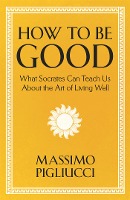What Socrates's greatest failure says about a 2,000-year-old question: is it possible to teach ourselves and others to become better people?
Can we make ourselves into better human beings? Can we help others do the same? And can we get the leaders of our society to care that humanity prospers, not just economically, but also spiritually? These questions have been asked for over two millennia and attempting to answer them is crucial if we want to live a better life and build a more just society.
How to Be Good uses the story of Socrates and Alcibiades and examples from Aristotle, Marcus Aurelius and Machiavelli, alongside modern interpretations to explore what philosophy can teach us about the quest for virtue today. Whether we are statesmen or ordinary individuals Pigliucci argues that with a little work day by day we all have the power to pursue the timely and timeless art of living well.

